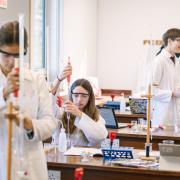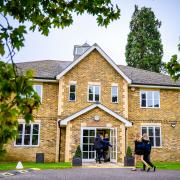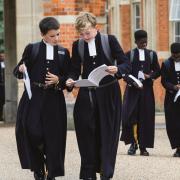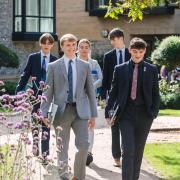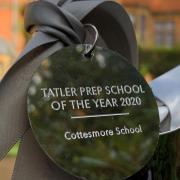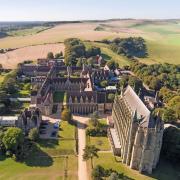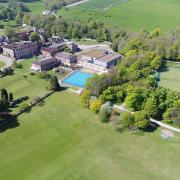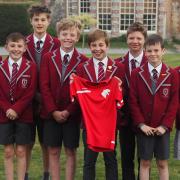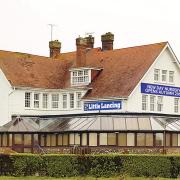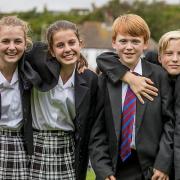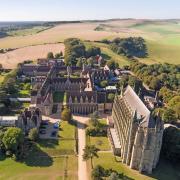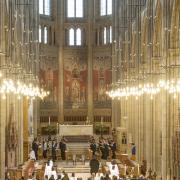In February 2013, some year 8 girls from Brighton and Hove High School went to a Leadership Conference where organisations were promoting the amazing work done by young people up and down the country.

Three teenagers spoke about an amazing CRED team trip they had been on to Uganda, where they worked with children, teaching and playing with them, to give them a brighter future. They explained how inspiring it was to help these children and how humbling and eye-opening an experience they had had. We sat, enthralled by the tales of joy and happiness that the teenagers on stage were speaking about, and each one of us had the same thought running through our minds: “We want to do this!”
During the long bus journey home, we all discussed the possibility of running a CRED trip with Brighton & Hove High School and realised that this was not just something to dream about, but that we could make it become a reality.

And over the next year, it did. After a selection process involving an application form, an interview and a commitment to fund raise a team of girls was established. For those who had been to the conference, it was literally a dream come true.
Our school and CRED decided that we could be most effective by helping Women At Risk, a project where Ethiopian women successfully provide structured counselling and vocational skills training for sex workers on the streets of Addis Ababa. Many of these women have children and our task was to run a summer school with catch up classes and activities that would help then integrate into school.
On 19th of July 2014, twenty-four BHHS girls, age 14 – 16, embarked on an incredible journey, landing in Addis Ababa after a seven hour flight, and promptly collected our luggage from the fairly rickety-looking baggage carousels before loading the coaches. And by loaded we mean secured on the top of the mini-bus with lengths of rope as we watched in disbelief and interest.
It was so interesting to see the contrasts between England and Ethiopia: you’d be hard-pressed to name a roundabout in England where live animals were often stranded in the middle, looking thoroughly bewildered. Or the tradition of hosting a coffee ceremony every single time one of your friends visit you, serving them the traditional three rounds of Ethiopian coffee (known as abol, tona and baraka). We’re afraid that even if you don’t like coffee, you still may have to grin and bear it as to refuse coffee that the hostess has offered you is a serious snub in Ethiopian society. However, we foreigners are often let off lightly as most accept that we are used to much weaker strains of “American” coffee, and they become quite amused watching our reactions to the strong, rich flavours.
Meeting and getting to know the children was so overwhelming as they were so happy to see us. There were over 100 children for us to teach divided into 6 classes. Everyday followed the same routine of two lessons in the morning, break, activities led by the CRED team leaders, indoor activities then outdoor activities. Nevertheless, each day felt like a whole new experience and the days were so jam packed that we barely had time to wolf down dinner and get de-briefed on the day before we collapsed into bed.
We loved the joy on the children’s faces as they eagerly took in every scrap of knowledge we could give them. The amazing sense of pride only increased as we watched the children race through the lessons, completing pages of sums or writing beautiful stories all without a word of complaint or interruption, just genuine interest. Some of the subjects we covered included english, maths, dance, music, science which were all incredibly fun and exciting to teach. The activities we introduced in the afternoons after lessons were things like dance, arts and crafts, parachutes, sports as well as quite a lot of games we play regularly in England, but that they had never heard of.
Towards the end of the day, two of the teaching groups would go on separate home visits, which was a trip to the homes of a child in our class to see where they lived and to learn about their home life. We all found these visits both eye-opening and truly life changing as there was such a huge differences in living standards. Some groups went on home visits that were quite upsetting as where these happy, smiling children in their class were living was a room that could barely fit a bed in. The women who had only recently begun the WAR programme tended to have basic living spaces, a room with a bed and possibly a cupboard or storage space between seven people. Some of the groups could barely fit in and were shocked and saddened to find out this was all they had, and yet it is still better than what they had before WAR and they were thankful for it. So while it was hard, it was also incredibly inspiring to see the strength in these women who can endure hardship and pain, over and over again, without giving in or losing that strength of will.
It was uplifting to see the women who had been part of the programme for longer and who had significantly improved lives. Their homes could have more than one room, more than one bed, sometimes even had commodities like running water or a small kitchen. This made it really clear for us how much of an impact WAR has had on their lives and just how many people it has helped.
On our final afternoon each of us were handed a pink rose as we entered the building, only to be greeted by everyone from the school, cheering and chanting when they saw us. We walked past the children to the back of the hall where there were seats left specially for us, high-fiving as we went. It was so lovely to see them all dressed in the same thing, a yellow football kit that we had donated to the school, as they looked like such an amazing team together, laughing and talking amongst themselves. Then the show started.
Everyone settled down as the performance began, as each group had used free time during the week to prepare something: singing, dancing or just showing of their wonderful work. And it was amazing to see a lot of the mothers in the audience, watching their children perform with the occasional tear in their eye. Prizes were awarded for the best behaved child in each class and the whole assembly was led in prayer, in both English and Amharic. The whole show was a fantastic success, especially a rendition of “Hallelujah” accompanied by ukuleles which had practically everyone there in tears. We were all so proud but also so sad at having to leave these amazing kids. It was a sad parting but we were also so happy as we had been able to share in the lives and stories of such inspiring people. We all hope they enjoyed their time with us and will remember us as we will certainly never forget them.
Coming back to the UK has been strange for all of us and though we are starting to adjust, the experience has changed all of us for the better. Having seen so many friendly, happy people who have so little has inspired us all to do more for those less fortunate than us.




